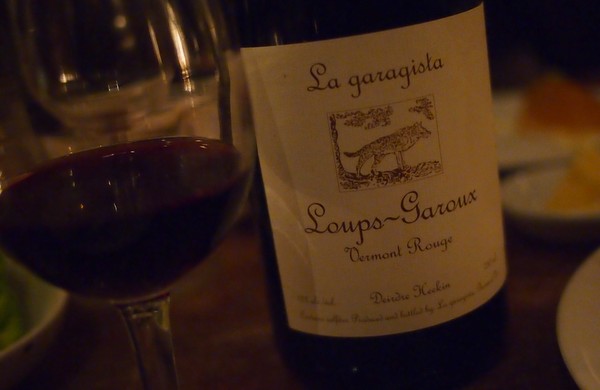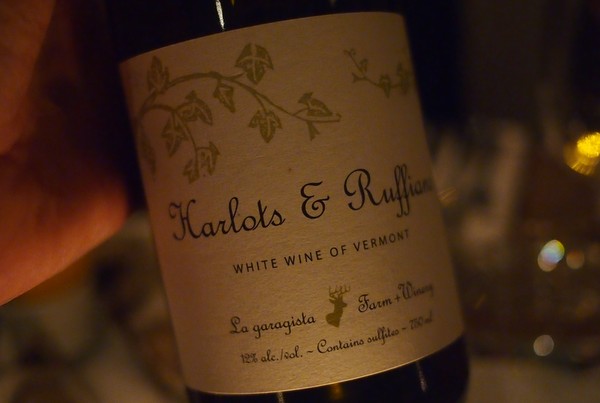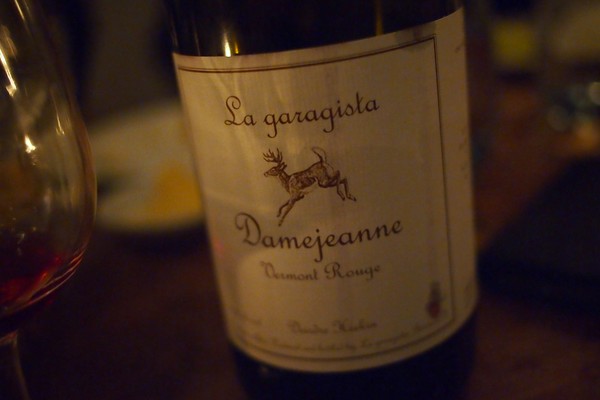|
La Garagista, Vermont, USA
Deirdre Heekin's remarkable naturally made wines
from a biodynamic farm in Vermont

Deirdre Heekin’s
La Garagista winery is a
remarkable project. It's a natural winery in Vermont, USA, using
local hybrid grapes. As you can imagine, when I was invited to meet
the owners and taste the wines over dinner at Brawn, I was intensely
curious. Wine from Vermont? Natural wine from Vermont? Worst case
scenario: the wines are terrible. Then I still get to hang out with
interesting, nice humans and eat at Brawn (whose food I love). So
the risk is low.

Deirdre
and her husband Caleb Barber run a restaurant in Woodstock, Vermont,
called Osteria Pane e Salute, and wine is Deirdre’s thing.
She’s a self-taught sommelier and runs the wine program at their
restaurant, specializing in indigenous Italian grape varieties (the
restaurant is Italian-themed). In 2008 she decided to plant some
vines. ‘Winemaking was just an educational element for myself,’ she
says. ‘I wanted to experience harvest.’ She’d heard of other
vineyards in Vermont – which is not a promising place for wine
growing, with very cold winters and a short, humid growing season –
and this inspired her. ‘They were making nice wine, so we started
planting our own vineyard.’ But Deirdre decided to make things tough
for herself, and farm biodynamically.

It turns out that the Garagista wines are
interesting and good. More than that, they are compelling and
delicious. They are made from varieties new to me: La Crescent
(which has Muscat parentage), Marquette (which has Pinot Noir
parentage) and Frontenac Gris, Blanc and Noir. The focus on hybrid
grapes is dictated by the Vermont climate (winters are cold enough
here to kill Vitis vinifera varieties, although Deirdre is
playing with a couple of vinifera varieties on her farm), and they
have a reputation for making wines that taste a bit odd. But this is
when they are vinified conventionally. Vinify them naturally, and
suddenly the oddness is lost. 'Conventional wines here illustrate
the difficulties that hybrid wines can have when they are made that
way,’ says Deirdre.
The vineyard has evolved over the last
several years. First vintage was in 2010, and since then they’ve had
the opportunity to lease two more vineyards. Currently they farm 2.5
hectares of vines, and produce a total of 500 cases annually. Their
goal is to get production up to 1000 cases, and there’s room to grow
to 3000 cases. The main markets are Vermont, New York, Boston,
California and Montreal. These wines are now being brought into the
UK.

Deirdre has recently written a book based
on her experiences on the farm, titled An unlikely vineyard: the
education of a farmer and her quest for terroir
(link
here)which is well worth a read if you want to know more
about this fascinating project.
THE WINES
La Garagista Harlots & Ruffians 2013
Vermont
12% alcohol. A blend of La Crescent (which spends 6 weeks on
skins) and Frontenac Gris (foot crushed and then fermented in
glass). Such a lovely, detailed wine. It tastes quite natural with
lovely peach, pear, apple and spice notes. Appealing with nice
complexity and fine acidity. 92/100
La Garagista Damejeanne 2013 Vermont
Raised in demijohns, this is 90%
Marquette and 10% La Crescent. It’s inspired by old fashioned
Chianti and Côte Rôtie, where a little white fruit is included in
the blend. Juicy, bright, fresh and berryish with some spiciness and
hints of earth. Very fresh meaty, spicy cherry fruit with lovely
focus and some elegance. Delicious. 91/100
La Garagista Loups-Garoux 2013 Vermont
Deep coloured and vibrant with lovely acidity and juicy bright
black cherries and plums, with a hint of lift and some appley notes.
Spicy, vivid, juicy and fresh with delicious cherry and raspberry
fruit. 90/100
UK agent: Les
Caves de Pyrene
Wines
tasted 02/15
Find these wines with wine-searcher.com
Back
to top
|

